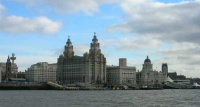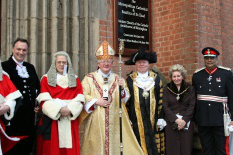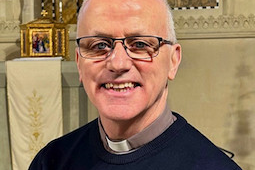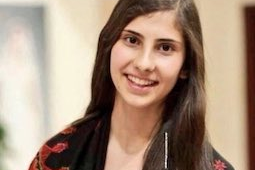Liverpool: Archbishop on 'dignity of the political vocation'

Liverpool
The Most Reverend Vincent Nichols, Archbishop of Westminster, has encouraged politicians to work for the good of all. The Archbishop was speaking at the Annual Civic Mass in the Metropolitan Cathedral of Christ the King, Liverpool, at 11am today, on his first official visit to the City following his appointment as Archbishop of Westminster last year.
He was welcomed to a full Cathedral by the Archbishop of Liverpool, the Most Reverend Patrick Kelly, who said: "Both in your years as a priest in this diocese and more and more over the years we know your concern that the light which comes from him who is the light of the world, shall inspire, challenge, and encourage all those who generously serve in public office. You can clearly see how strongly that service to the common good is represented here today." The congregation then applauded Archbishop Nichols as Mass began.
In his homily to a congregation including many local politicians and civic dignitaries Archbishop Nichols began by commenting on the quality of public debate today and of the differences which exist in society. He went on to speak about political life and about current disillusionment with the political process, going on to say "Yet it is precisely this experience of helplessness that is addressed by our faith".
He later spoke of the political vocation saying: "This is the true dignity of the political vocation: that by working for the good of all, the genuine common good of our society, politicians and people in public life attempt to create signposts of that greater hope, the hope of the fulfilment of all our potential, which will indeed be granted to us finally through the victory of Christ himself."
He concluded by speaking of hope and the values of truth and love.
The Archbishop greeted the congregation after the Mass and will celebrate a Service of Evening Prayer in celebration of marriage and family life in the Cathedral this afternoon.
The homily text follows:
Public debate in our society today is often strident. Organisers are on the look out for participants who not only profoundly disagree but who are also prepared to be dismissive and disparaging about each another. It is supposed to ‘spice up’ the debate, but I suspect it simply reveals the fact that often such debates are planned as a type of entertainment.
Yet serious differences do exist, not least about faith in God. There are some voices who do not hesitate to speak of faith, such as we celebrate here today, as a delusion, as a sign of childish immaturity, as an abandonment of reason and as a source of great wrong doing. Not surprisingly they wish to see religious faith banished from public places.
Our presence together here this morning indicates that this is not a view that we hold. Yet we have to have it in mind, even as we celebrate this Mass, attentive to the Word of God that has just been proclaimed to us and here too we must be aware of these differences and divisions.
In fact that Word of God highlights some of these differences. The words of Jeremiah, and those of Jesus in the Gospel of Luke, emphasise the profound differences that open up between those who see life as the work of God and those whose minds and hearts reject such a perspective. For Jeremiah the difference is between on the one hand a well-watered land and on the other a parched earth, between a green oasis and a wilderness. For Jesus the contrast is as sharp as knowing the blessings of faith, or experiencing the emptiness of passing riches and of human praise.
Even if some of these sharp contrasts are now appearing in our society, our overall situation is different, because we have been formed, for almost 2000 years, by the perspective and values of this Christian faith with its powerful Jewish roots. The fruit of this faith, nurturing human goodness, is to be found in so many different people today.
It was in this city, many years ago now, at an ordination of a priest in St Anne’s Overbury Street, that an image illustrating this came to my mind. During the Mass of Ordination, when the church was unusually packed, all the goodness of the community was there to be seen. It was if an underground stream had burst out from under the surface and was there before us in all its glory, glistening in sunlight. Shortly that stream would disappear back underground, but the trees, the flowers, the goodness on the surface, would continue to draw nourishment from that deep-down source. Such is often the role of faith today: hidden yet fruitful. And here, at this Mass, we ask God to renew in us the well-spring of his presence, his grace, which gives rise to such generosity and goodness.
May I illustrate this in one particular aspect of our political life today?
In the last few weeks I have been involved in a small number of public debates on our society today, all of them shaped by the prospect of a General Election. Over and over again the mood that has emerged is one of disillusionment and mistrust. It is said that people are disillusioned with the political process and mistrustful of those in the key roles within it. This is due, in part, to the misbehaviour of some in positions of trust, and, in part, to the complexity of the issues facing us: security threats, financial problems and far-reaching social change. Indeed, many in these debates have spoken of a sense of helplessness among people, and we are tempted to retreat into their own world and assume a veneer of indifference towards everything else. Many, it is said, feel trapped in the grip of powerful circumstances and sense only of being a victim.
Yet it is precisely this experience of helplessness that is addressed by our faith.
The coming of the Word of God in our flesh, which is the central truth of faith, is precisely an exploration and transformation of our helplessness.
From the crib to the cross, Jesus, the Word made flesh, rejects human power as the key to our crisis and announces a new way of life, one built around God. He even embraces the full identity of a victim, an entirely innocent victim. And he transforms it.
This is what the second reading today is about. St Paul insists that the whole project of our faith hinges on the truth of the resurrection of Jesus from the dead. In thi resurrection lie the ‘forgiveness of sins’ and the promise of the fulfilment of our destiny. Paul states bluntly: ‘If Christ has not been raised, your faith is futile and you are still in your sins.’ Only in his resurrection does Jesus take our experience of being a victim and transform it with the promise of recovery and new life.
He releases us from the grip of our own helplessness, and he restores in us the prospect of goodness and hope.
This is the underground stream of faith which nourishes so many today who strive to improve our shared life, to lift the burden of victimhood and helplessness, and who seek in so many ways to serve the common good. The fruit of this hidden stream is seen in the work of every sincere politician who is dedicated, at any level, to public service. This is the true dignity of the political vocation: that by working for the good of all, the genuine common good of our society, politicians and people in public life attempt to create signposts of that greater hope, the hope of the fulfilment of all our potential, which will indeed be granted to us finally through the victory of Christ himself.
Today we draw strength from the words and the work of Jesus. Here we are strengthened to go out and encourage people to try again, to raise their heads rather than turn away, to look intelligently and critically at what is needed, to make their best judgments and then act especially during this period of debate and the forthcoming election. And we draw strength to appeal to politicians to do all they can to maintain a level of debate fitting to the issues we face, to reject the easy recourse to belittling their opponents, and to reject using emotive yet complex issues to foster division in society in the hope of gaining votes.
The faith we celebrate at this Civic Mass is one which brings us hope for today and for tomorrow. As Pope Benedict has stated very clearly, the work for integral human development can be embraced with real hope because the key values which inspire that work are truth and love, and these are constantly arising in our hearts. We long for truth; we are hungry for love. These instincts never completely abandon us, for they are a calling placed within us by God. They urge us forward to serve each other in our common life. And they find their fulfilment in Christ Jesus, whose victory in service of love and truth we celebrate and share in this Mass. Amen
+Vincent Nichols



















